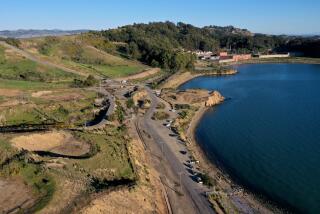Earth First! Organizer Judi Bari Dies
- Share via
SAN FRANCISCO — Judi Bari, a firebrand Earth First! organizer who was permanently injured when a pipe bomb exploded under her car seat on the eve of the 1990 “Redwood Summer” anti-logging protest, and who led the radical group to renounce tree-spiking, died Sunday of complications of breast cancer at her Mendocino County home. She was 47.
Bari brought the concerns of labor to the environmental movement, along with a commitment to nonviolence. Just under 5 feet tall, Bari was a small, witty, acid-tongued activist whose manner could sometimes alienate even supporters, although her devotion to her causes was never in doubt.
“I think Judi Bari is one of the most courageous people I ever met and one of the most committed,” said Dave Foreman recently. Foreman founded Earth First! but broke with the group, in part over Bari’s advocacy of nonviolence.
And environmentalist David Brower, a longtime leader of the Sierra Club, said recently of Bari: “She’s braver than I am, and she’s tougher.”
Bari’s death, at her tiny, document-crammed cabin in the hills above the old logging town of Willits, Calif., put an end to a life devoted to radical causes.
Bari, who grew up in Baltimore, dropped out of college during the Vietnam War and began a career of protest and dissent. She did stints in the U.S. Postal Service and in factories, as a union organizer and labor activist. She once organized a wildcat strike at a government bulk mailing complex in Maryland.
In 1979, she moved to Santa Rosa, becoming a fixture at demonstrations on Central America and abortion rights. Bari made a living as a carpenter until she realized that the beautiful redwood planks she was hammering into houses came from trees that were living when Columbus landed in the New World.
She ditched woodworking for Earth First!, a loosely organized group with the slogan: “No compromise in defense of Mother Earth.” It had become infamous for tree-spiking and trashing logging equipment.
Old guard Earth Firsters had viewed loggers as the enemy, but Bari saw them as potential recruits, if they could be persuaded that the big timber companies were their mutual enemies, more interested in profits than in sustainable employment.
A logger once asked Bari if she was a communist. She replied: No, I’m much more radical.
Bari brought a feminist sensibility to the macho, mostly male group of activists, and led the Northern California Earth First! to renounce tree-spiking and adopt a pledge of nonviolence, a vow at which some of her opponents scoffed. She told the San Francisco Examiner that the movement is “largely led by women now, women who are home-based and defending the place they love.”
In May 1990, Bari and fellow Earth Firster Darryl Cherney were driving to a rally to drum up support for a civil disobedience campaign when a bomb exploded under Bari’s car seat. The explosion fractured her pelvis, damaged her spine and paralyzed one foot.
While Bari was still in the hospital, police arrested her and Cherney for allegedly illegally transporting explosives. Prosecutors declined to file charges, citing lack of evidence.
Bari and Cherney sued the FBI and Oakland police in 1991 for false arrest, accusing the agencies of violating their civil rights. Bari and other radicals believed police and federal agents either planned the bombing or took it as an opportunity to discredit the environmental movement.
“This case is not about me, Darryl or Earth First!” she wrote recently in the Earth First! Journal. “It is about the right of all activists to work for social change without fearing repression by the government’s secret police.”
The case has been virtually on hold for six years, and recently Bari said that she believed the FBI was just waiting for her to die. “The FBI wants to make it last 20 years,” said Bari, whose lawyers had sought to expedite the case on medical grounds. “They have no other defense.”
Her injuries made Bari give up tree-sitting and chaining herself to equipment. “I always loved the field stuff,” she said. “It was the part I liked best; it’s been real hard not to be able to do that.”
Bari was characteristically both blunt and accusatory last October when she told friends and family that her breast cancer had spread to her liver, wondering aloud if the hormone-laden foods she grew up eating, or the toxics of industrial society might have contributed to her illness.
Bari is survived by two daughters, Lisa and Jessica.
More to Read
Sign up for Essential California
The most important California stories and recommendations in your inbox every morning.
You may occasionally receive promotional content from the Los Angeles Times.













